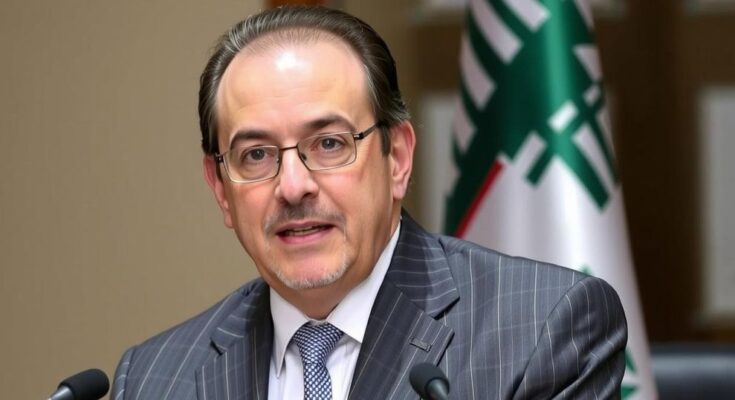Lebanon’s President Joseph Aoun appointed ICJ judge Nawaf Salam as prime minister to address the country’s severe economic crisis. Salam’s nomination received overwhelming support from lawmakers, marking a significant shift following a two-year caretaker government. While facing substantial challenges, Salam’s leadership aims to implement needed reforms for international support and reconstruct areas affected by conflict.
Lebanon’s President Joseph Aoun has appointed international jurist Nawaf Salam, currently presiding judge at the International Court of Justice (ICJ) in The Hague, as the new prime minister, with an aim to guide the nation out of its dire economic crisis. This decision follows two years of governance under a caretaker government and was influenced by an overwhelming majority of the Lebanese lawmakers who endorsed Salam. The presidential office formally announced that Salam would be tasked with forming a new government, despite his current presence abroad, necessitating his return to Lebanon soon.
After holding consultations with the parliament, it was revealed that 84 lawmakers supported Salam’s appointment, whereas eight others favored retaining interim Prime Minister Najib Mikati, while 35 members chose not to endorse either candidate. President Aoun’s election, which had concluded a prolonged two-year vacancy at the presidential office, has been attributed to the weakening position of Hezbollah following their recent conflict with Israel. Aoun expressed hope that the formation of a new government would proceed swiftly and efficiently.
Firas Hamdan, an independent lawmaker, described Salam’s nomination as a purely Lebanese initiative free from foreign interference, highlighting the judge’s commitment to combating corruption. Supporters believe that his impartiality and experience will be pivotal in enacting essential reforms needed to secure international aid and recovery from the nation’s profound financial collapse. This comes at a critical time as Lebanon seeks to rebuild areas devastated by previous conflicts and work towards stabilizing its political landscape.
As Salam embarks on this challenging journey, he will be tasked with facing significant obstacles, including implementing reforms to meet donor expectations. Following the latest ceasefire agreement, it is also imperative for Hezbollah to diminish its military influence and allow a more political approach to governance. Lawmaker Georges Adwan indicated that it is time for Hezbollah to shift focus away from armed conflict, potentially marking a significant political transformation in the region. The pathway to forming a new government, however, may still face delays in light of Lebanon’s intricate political intricacies, which have historically hindered swift resolutions in governance.
Lebanon has been experiencing a severe economic crisis characterized by hyperinflation, widespread poverty, and a failing currency. The nation’s political climate has long been plagued by divisions and the entrenchment of a crony system within governance led largely by political groups such as Hezbollah. The appointment of Nawaf Salam signifies an attempt by the newly elected President Aoun to navigate out of an extended period under a caretaker government and restore political legitimacy. The role of the prime minister in Lebanon is significant as it involves negotiating reform oversight to appeal to international entities willing to provide financial assistance during this crisis. Salam, seen as a reformative figure, has the potential to address both international expectations and local demands for change amid an increasingly complex political landscape.
In conclusion, the appointment of Nawaf Salam as Lebanon’s prime minister by President Joseph Aoun reflects a significant political shift aimed at addressing the country’s economic distress following a long period of caretaker governance. With broad parliamentary support, Salam’s selection is intended to rejuvenate efforts towards vital reforms essential for international aid. Nevertheless, the new prime minister faces an uphill battle against entrenched political interests and the residual impact of previous conflicts as he seeks to forge a constructive path forward for Lebanon’s future.
Original Source: www.hindustantimes.com




